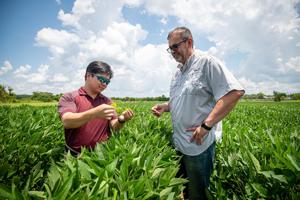Mississippi State Unites with 10 Universities to Tackle Weeds

Mississippi State University is taking significant steps in the fight against herbicide-resistant weeds that pose a serious threat to soybean production across the United States. In collaboration with nine other land-grant universities, the institution is part of a groundbreaking initiative supported by a $500,000 grant from the United Soybean Board. This initiative, known as the Herbicide Resistance Monitoring Network (HERMON), aims to monitor the evolution of weed resistance and develop effective management strategies.
The HERMON project seeks to address the growing issue of herbicide resistance, which has become increasingly prevalent in recent years. As farmers face challenges in controlling weeds that no longer respond to standard herbicides, the need for innovative solutions has never been more urgent. The collaboration among participating universities allows for a comprehensive approach to understanding and managing resistant weed populations.
In addition to monitoring weed resistance, HERMON focuses on creating faster and more reliable diagnostic protocols. These protocols aim to equip researchers and farmers with the tools they need to identify resistant weed species quickly and accurately. This initiative is particularly crucial for optimizing region-specific weed management strategies, ensuring that farmers can effectively combat these persistent agricultural challenges.
Researchers involved in HERMON will collect data from various regions to track the evolution of herbicide resistance patterns. By analyzing this information, scientists hope to gain insights into how different weed species adapt to herbicides and develop strategies to counter these adaptations. The collaborative nature of the project allows for the sharing of knowledge and resources, enhancing the overall effectiveness of the research efforts.
Mississippi State’s involvement in this initiative underscores its commitment to agricultural research and innovation. As part of a network of esteemed institutions, the university is positioned to play a pivotal role in addressing one of the most pressing issues facing soybean farmers today. The findings from HERMON could lead to the development of more sustainable agricultural practices, ultimately benefiting farmers and consumers alike.
The urgency of this research is underscored by the potential economic impact on soybean production in the United States. Soybeans are a crucial crop, contributing significantly to the agricultural economy. By tackling herbicide-resistant weeds, researchers aim to protect crop yields and ensure food security in a changing agricultural landscape.
As the HERMON initiative unfolds, Mississippi State and its partner universities are poised to make meaningful contributions to the fight against herbicide resistance. With ongoing support from the United Soybean Board, the project aims to safeguard the future of soybean farming and promote sustainable agricultural practices nationwide.






